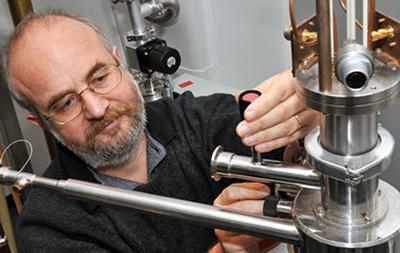Chemistry Researcher wins ERC Advanced Grant for the second time in 10 years

Five University of Southampton researchers have won prestigious and competitive European research grants, totalling more than €12 million. The funding awards mark the biggest success the University has had in winning the European Research Council’s (ERC) Advanced Grants.
One of the five researchers awarded is Chemistry’s Professor Malcolm Levitt, Professor of Physical Chemistry who is receiving an ERC Advanced Grant for the second time in 10 years. Malcolm is joined by Professor Lajos Hanzo who is also receiving the grant for a second time - a superb achievement given that only 29 other UK researchers have accomplished this in the last 10 years.
The grants have been awarded as follows:
Professor Malcolm Levitt, from the School of Chemistry, has won a grant of €2.76 million for his FunMagResBeacons (Functionalised Magnetic Resonance Beacons for Enhanced Spectroscopy and Imaging) project. The aim is to develop agents that may be used together with magnetic resonance (MRI) and other forms of spectroscopy to map out specific chemical and physical conditions deep inside an object, ultimately leading to potential applications such as cancer detection and diagnosis.
Professor Levitt said: “It is enormously gratifying to be awarded a second ERC Advanced grant. Firstly it is a mark of recognition and appreciation that one’s research ideas have been received so well by the highly rigorous and expert ERC Advanced grant panel, and the expert reviewers. To do this once is fantastic; to succeed twice is simply astonishing. Secondly it is wonderful to look forward to the years of research ahead and the chance to assemble a great research team and to attempt the realisation of a wild scientific dream.”
Professor Gill Reid, Head of Chemistry at the University added: "For Malcolm to receive two ERC Advanced Grants in a 10 year period is an exceptional achievement and is a real testament to his scientific vision and to the very high quality of the research being performed by the group in the School of Chemistry. NMR is a really powerful technique with many important applications across the physical and life sciences. I am sure this funding will lead to a number of exciting new discoveries in the field.”
Professor Lajos Hanzo, from Electronics and Computer Science, successfully bid for €2.49 million for his QuantCom research project. The aim is to solve part of the ‘quantum jigsaw puzzle’ and contribute to the conception of the wireless Quantum Internet, or Qinternet, conceived for seamless high-speed connectivity across the globe at uncompromised security.
Professor Hanzo said: “It is a humbling experience to contribute to this new wave of frontier research, which would not have been possible without the closely-knit collaboration with my much valued colleagues in the Next-Generation Wireless team of ECS.”
Professor Peter Kazansky, from the Optoelectronics Research Centre, has been successfully granted €2.5 million for his project entitled ENIGMA (ENgIneerinG MAterial properties with advanced laser direct writing). The project will examine the interaction between intense ultra-short light pulses and matter at, or below, the wavelength scale, reaching states of matter found only deep in the cores of the Earth and other planets.
Professor Kazansky said: “The ENIGMA project will push the frontiers of laser material processing to an unprecedented level of control and will develop a novel family of devices that will feed into the future of optics, electronics and computing.”
Professor Nikolay Zheludev, also from the Optoelectronics Research Centre, has been successfully awarded €2.57 million for his FLEET (FLying ElectromagnEtic Toroids) project, which will study the generation, detection and interaction with matter of Flying Toroids, a type of light pulses never experimentally studied before.
Professor Zheludev said: “This project represents an exciting opportunity to advance optics and electromagnetism in a radically new direction since Hertz, Marconi, Popov and Tesla developed the ground-breaking technology for generating, detecting, and communicating with transverse electromagnetic waves.”
Professor Tony Brown, from the School of Geography and Environment, has been awarded €2.66 million for a project entitled TerrACE, which will look into the long-term creation, maintenance and use of ancient agricultural terraces.
Recognising the unprecedented success, University of Southampton President and Vice-Chancellor Professor Sir Christopher Snowden said: “I am absolutely delighted and congratulate Nikolay, Lajos, Peter, Tony and Malcolm on their success with these prestigious awards. The ERC represents an important source of research funding and these successes reflect the very high quality of research at our University.”
Professor Mark Spearing, University Vice-President (Research and Enterprise), added: “This is a fantastic achievement for the five colleagues who have won ERC grants. These are particularly competitive and prestigious grants to win and they also provide unrivalled freedom to develop an area of research according to the individual’s agenda.
“I am delighted to provide my personal congratulations to Nikolay, Lajos, Peter, Tony and Malcolm.”